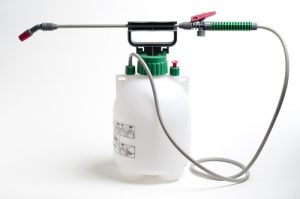The Benefits of Pesticides
By Chris Williams on September 20, 2011.
Pesticides are invaluable in protecting health and property, and in promoting a better environment. Most of us are pretty familiar with how and why pesticides are used around our homes and yards. But most of us don’t realize the role that pesticides play behind the scenes in making our lives safer and easier.
We are most familiar with insecticides, but insecticides are just one type of pesticide. There are other pesticides that are used extensively in ways that we often take for granted. There are specialty pesticides to control weeds (herbicides). or mold (fungicides), or rodents (rodenticides), among others. A pesticide is any chemical that is used to kill or manage a pest.
Pesticide Use in Public Health
Water companies add the pesticide chlorine (yes, it’s a pesticide) to public drinking water to kill harmful bacteria. Pesticides known as disinfectants eliminate dangerous organisms that cause disease. Rodenticides are used in public housing units to control rodents that carry diseases such as hantavirus. Mosquitocides are used to protect us from mosquitoes that carry diseases such as yellow fever or West Nile virus. Herbicides are used to control allergen-producing weeds such as ragweed and poison ivy.
 Raw commodities and packaged food products are protected from insect contamination by the controlled use of insecticides during processing, manufacturing, and packaging. Pesticides are used in food warehouses and grocery stores to manage insects and rodents attracted to food. Plastics, paints, and caulks may contain fungicides to prevent mold. Household cleaners and disinfectants often contain bactericides to kill germs).
Raw commodities and packaged food products are protected from insect contamination by the controlled use of insecticides during processing, manufacturing, and packaging. Pesticides are used in food warehouses and grocery stores to manage insects and rodents attracted to food. Plastics, paints, and caulks may contain fungicides to prevent mold. Household cleaners and disinfectants often contain bactericides to kill germs).
Pesticide Use in Transportation
Herbicides are used in many ways to make highway travel safer. If you can see that stop sign, it’s probably because the roadside has been sprayed with herbicide to eliminate brush and tall weeds around intersections, traffic signs, and guardrails. Mowing and cutting can clear roadside vegetation, but herbicides provide longer-lasting results. Herbicides are applied to control vegetation along highway shoulders so that water can run off, reducing the risk of accidents from hydroplaning.
Did you know that airlines protect passenger safety by adding fungicides to their jet fuel to reduce the growth of mold in fuel filters? Railroads apply herbicides along tracks, at crossings, and in railroad yards to improve visibility and passenger safety. Railroad ties are protected from decay and insect damage by the use of wood preservatives, another type of pesticide.
Pesticide Use in Public Utilities
If the growth of seedling trees wasn’t controlled with herbicides, power lines would soon be obstructed, affecting electrical service. Pesticide treatment of stumps prevents cut trees from resprouting. Herbicides are used to keep areas around power stations free of vegetation so that workers have clear visibility when working around high voltage lines. In these sites, herbicides are less expensive and less dangerous than using power tree trimming equipment. Herbicides are used to keep above ground pipelines and connections free of overgrown vegetation to ward off vandalism and to allow inspections and repairs.
When we consider the possible risks of the use of pesticides, we also have to consider the many benefits. There are significant health and safety risks associated with leaving certain pests uncontrolled.
[Source: The Benefits of Pesticides, A Story Worth Telling; Purdue Extension Service]